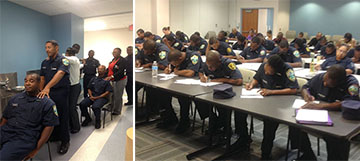
POLICE GET DISABILITIES SENSITIVITY TRAINING (VIUCEDD)
11/03/2015

|
A regular Source column, Undercurrents explores issues, ideas and events developing beneath the surface in the Virgin Islands community.
A police officer in a patrol car sees a pedestrian jaywalking across a busy street. The officer gets on her loud speaker and orders the man to stop and wait for the officer. But the man, having reached the other side of the street, continues walking along the sidewalk, apparently ignoring the order. The officer is stuck in slow moving traffic, but follows the pedestrian and repeats the order. Still the man doesn't stop. In fact, it seems he may be trying to get away because he's walking faster. Finally the officer turns on her siren and flashing lights, pulls around the traffic and comes abreast of the pedestrian.
What happens next?
If the officer has had training in how to spot "hidden disabilities," what might happen next is that she determines that the pedestrian is deaf. If she hasn't had that training, what happens next could be an unproductive encounter or even escalate into a tragic incident.
About 100 Virgin Islands police cadets and officers received just such training last week, in workshops conducted on St. Thomas and St. Croix by Kimberly Mills, associate director of the Virgin Islands University Center for Excellence in Developmental Disabilities.
The course was designed especially for new officers, Mills said, but a few veterans also took it as a refresher. It included information about various types of disabilities, including language disorders, autism, stroke and mental illness. There were talks by several experts, videos, role play and other interactive sessions.
Mills also had some practical tips, not only for police but for other first responders. For instance, a pad and paper can be handy tools for communicating with a deaf person. A person who is autistic may hide in a closet rather than run to safety during an emergency. A person who is wheelchair-bound and is caught in a house fire may need thick gloves to maneuver the hot chair.
Archie Jennings, attorney for the Disability Rights Center, presented a session on deescalating potentially violent situations, particularly those involving a person with mental illness or one under the influence of alcohol or drugs who is behaving in an aggressive or other socially unacceptable manner.
"I've heard horrible, horrible stories," he said. When an officer doesn't recognize mental illness but instead treats a person having a psychotic episode as a violent criminal, the results can be tragic.
"Yelling at them or trying to coerce them won't work," he said. Their adrenalin is up and they will only react more physically.
The major concern in such situations is safety, Jennings said, the public's safety, the safety of the officer and the safety of the individual who is acting out.
The idea is to keep calm and to try to calm the person; talk in a normal tone of voice; try to identify the individual; and if possible get a family member or other loved one who knows him to talk with him, without jeopardizing anyone's safety.
The police "need a crisis intervention team as a back-up," Jennings said. Right now, officers can and do rely on psychiatrists and psychologists to help calm and restrain individuals when necessary, but ideally the force should have a crisis intervention team especially trained for such situations.
Not all encounters are so dramatic or potentially dangerous, of course. But the failure to understand a person's disability can still make for a negative experience. If an officer is aware of the problem, it won't really be a problem.
Someone who has a language disorder, for instance, may not be able to respond to a police officer's question immediately, Mills said. He may take an extra minute to process the question, another minute to formulate his answer and possibly a little extra time to actually articulate his reply. All that's needed in that situation is patience.
Mills had some officers in the workshop participate in various exercises designed to help them understand what it feels like to have a disability.
In one activity, several officers played the "tell a story" game in which someone begins a story. The plot develops as - one by one - each person adds something to the tale. Then the officers played again, but this time they were told they could not use any words containing the letter "n." That restraint meant they had to take extra time, and go through a separate mental process, before they spoke - similarly to someone with a learning disability.
Mills praised the officers and cadets who took part in the workshop, adding, "They responded well" to the exercises and to the training overall. She and Jennings both said they are hopeful there soon will be more training.